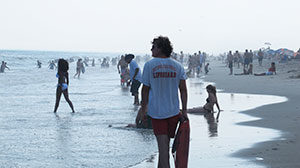 I was 13 when I got my first “real” job with an actual paycheck (I’d already been babysitting for a while before that). I started working during a summer break, and continued to work a few hours during the school year as well. Most of my friends had jobs of some sort during the summers. By the time we were getting ready for college, I’m not sure I could name ONE person in my extended circle that wasn’t working.
I was 13 when I got my first “real” job with an actual paycheck (I’d already been babysitting for a while before that). I started working during a summer break, and continued to work a few hours during the school year as well. Most of my friends had jobs of some sort during the summers. By the time we were getting ready for college, I’m not sure I could name ONE person in my extended circle that wasn’t working.
As I’ve gotten older, it seems I’m seeing fewer teen workers. Other parents lament their kids would like to work, but can’t find jobs. Some employers have raised their minimum employment age to 16 or 18. An interesting article in USA Today indicates that my anecdotal experiences are accurate: teen employment is down. Way down, as a matter of fact. At its high point in 1978, more than 70 percent of teens had summer jobs. That number plummeted to just 42.5% last year. Some of the reasons cited in the article include:
- Focus on academics over employment
- Fewer jobs available to teenagers as older part-time employees stay in the workforce
- Lingering recovery from the Global Financial Crisis
Other contributing factors that I have seen are lack of transportation – jobs too far from home to walk/ride a bike/use public transportation, parents not available to give rides (as they are working) and the explosion of summer sports / travel clubs and the general “overscheduling” of teens and younger kids.
Why does the decline in teen employment matter, and how is it related to recruitment?
For starters, summer jobs / work experience are often cited as important factors when applying for scholarships and universities. Students who don’t have work experience are sometimes viewed less favorably, or as less motivated, than students who hold down jobs in addition to focusing on academics and sports. When it comes time to apply for internships or enter the workforce, prior work experience is practically required. Remember that old saying about needing a job to get experience, but not being able to get the experience without a job?
Furthermore, jobs teach kids how to show up on time, how to put in a full (or hard) day of work, how to get along with a boss or co-workers, how to follow instructions, how to interact with the public, and more. These are different lessons than are learned in an academic environment, on a sports team, or doing chores at home. Teen employment can help kids focus on what type of work they enjoy — or don’t enjoy — doing, while also teaching responsibility and lowering the risk of getting into trouble. Learning how to work is an important life skill. Entry-level candidates who have focused exclusively on academics and/or sports may be at a hiring disadvantage compared to their peers with prior work experience. They may also enter the workforce with unrealistic expectations about what a job entails.
How can recruiters help?
Ask your clients about their need for seasonal workers and opportunities for teen employment. Who do they hire, and how? Do they offer internships or on-the-job training programs for teenagers that can lead to full-time work after school is completed? Are they working with their local school districts or community colleges to develop training programs for skilled trades or other roles which require more than a high school education, but less than a university degree?
What about your recruitment firm? Do you have admin tasks that need to be completed but aren’t a priority for you? Are there opportunities for teen employment that could provide meaningful work experience and also clear your to-do list? A well-prepared workforce needs both education AND experience.
